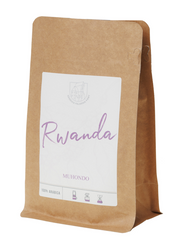Rwanda – an African gem in the world of specialty coffee

If you love floral notes and light, tea-like cups, Rwandan coffee might be your new love.
This is a country that not only captivates with its landscapes but also produces some of the most refined specialty beans in the world.
I still remember the first time I brewed Rwandan coffee in a V60. The aroma of lilac, jasmine, and a gentle citrus acidity made me feel—just for a moment—like I was on a plantation terrace overlooking Lake Kivu.
Where does coffee grow in Rwanda?
Geographic location
Most Rwandan coffee farms are located in the western and northern parts of the country, in regions like Nyamasheke, Gakenke, and Musasa.
Volcanic soils, high altitudes (1,400–2,000 m above sea level), and regular rainfall create ideal growing conditions for coffee.
Microclimate and soils
The Virunga Mountains and nearby lakes create microclimates that support the slow maturation of coffee cherries.
It’s thanks to this that Rwandan coffees have such a distinct and complex flavor profile.
The History of Coffee in Rwanda
A challenging road to quality
Rwanda’s history has not been easy, and the coffee industry suffered greatly due to the events of the 1990s.
However, by the early 2000s, the country began to recover, investing in quality and farmer education.
Cooperatives, washing stations, and training programs emerged—turning Rwanda into one of the icons of African specialty coffee.
The role of small producers
In Rwanda, coffee is mainly cultivated by smallholder farmers.
Most grow coffee on tiny plots, harvest the cherries by hand, and deliver them to local washing stations.
This small-scale model allows for exceptional attention to detail and bean quality.
What makes Rwandan coffee unique?
Botanical varieties
The most common variety is Bourbon and its local mutations (such as Jackson and Mbirizi), known for their refined profiles and well-balanced acidity.
Processing methods
Rwandan coffees are typically fully washed, though experimental methods such as natural, honey, and anaerobic are becoming more popular.
The washed process gives the beans clarity and elegance.
Flavor and aroma
The sensory profile of Rwandan beans is a true treat for the senses:
-
floral aromas (jasmine, lilac, chamomile)
-
citrus acidity (lime, grapefruit)
-
tea-like and red fruit notes (currant, cranberry)
This is a refreshing, light, and clean coffee.
Perfect for a morning ritual or as a connoisseur’s espresso.
How to brew Rwandan coffee
Pour-over methods
V60 and Kalita are great for highlighting the light and floral qualities of Rwandan coffee.
I recommend using water at about 90–92°C and a relatively coarse grind.
If you're looking for beans perfect for pour-over brewing, check out our selection of filter coffees →.
AeroPress
A great match for Rwandan beans. A short brew time (around 1:30) and light extraction bring out their juiciness.
Cold brew
A perfect summer option: the result is a tea-like drink with citrusy notes.
Brew for 12–16 hours in the fridge for best results.
Ethics and Sustainability
Social responsibility
Rwandan coffee is not just about taste. It’s also about people—those who have rebuilt their lives and communities with passion and resilience.
More and more initiatives now support women producers, educate farmers, and invest in local development.
Ecology
Most farms use no pesticides, rely on compost, and prioritize biodiversity.
Many washing stations use natural drying methods and recycle water from fermentation processes.
Where to buy Rwandan coffee?
At Gdańska Palarni Kawy, you’ll find light-roasted Rwandan beans perfect for alternative brewing methods.
It’s a great choice for those seeking clean, elegant coffee with a story behind every cup.
You can also sign up for a coffee subscription →, and receive freshly selected beans every month—without leaving your home.
Summary
Rwandan coffee is more than a cup with a complex flavor profile.
It’s a story of people, courage, and determination.
These are beans worth knowing—and appreciating.
If you haven’t tried them yet, reach for Rwandan coffee and let it surprise you with its lightness and elegance.
If coffee is your passion (or just becoming one), check out our coffee workshops →.
From brewing basics to advanced techniques, we’ll share our knowledge and hands-on experience in the cozy setting of our roastery in Gdańsk.
Recommended


